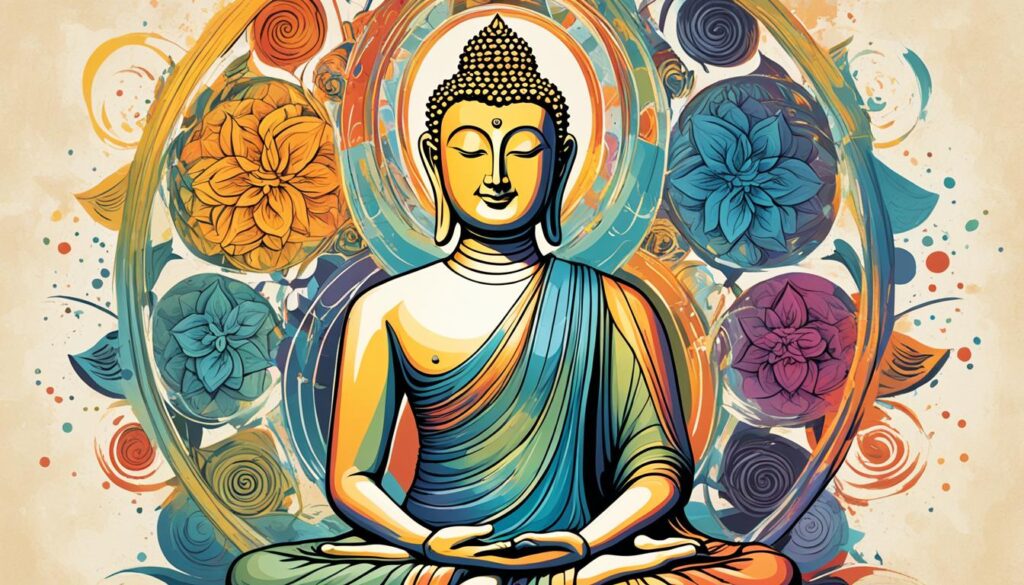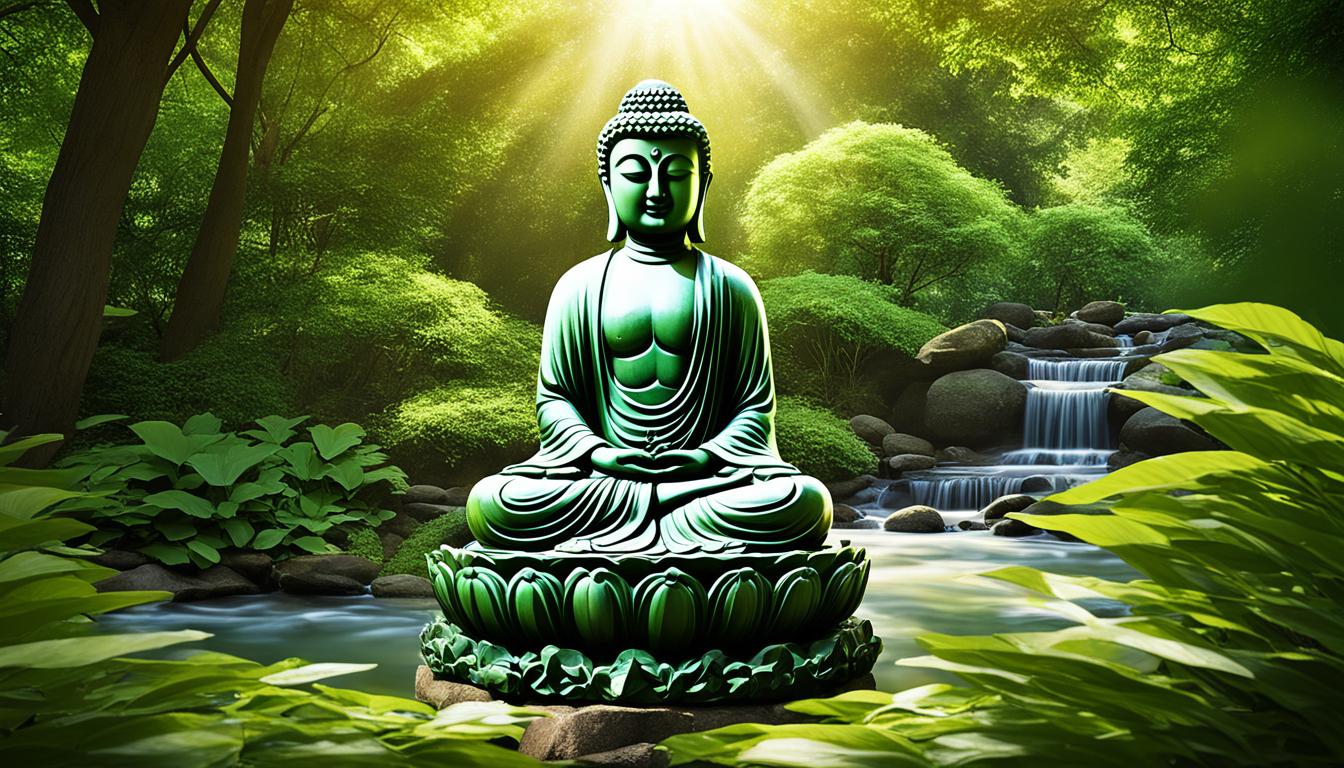“Do not dwell in the past, do not dream of the future, concentrate the mind on the present moment.” – Buddha
Buddhism, a profound and ancient philosophy, offers a path towards inner peace, wisdom, and enlightenment. Rooted in the teachings of Siddhartha Gautama, also known as the Buddha, Buddhism has captivated millions of followers for centuries. Its core beliefs and practices revolve around mindfulness, compassion, and the understanding of the impermanence of life. By exploring the essence of Buddhism, you embark on a journey of self-discovery and liberation.
Key Takeaways:
- Buddhism, founded by Siddhartha Gautama, emphasizes mindfulness, compassion, and the understanding of suffering.
- The Four Noble Truths and the Noble Eightfold Path form the foundation of Buddhist teachings.
- Karma and rebirth are significant concepts in Buddhism, emphasizing personal responsibility and the cycle of existence.
- Meditation and mindfulness practices cultivate self-awareness and lead to personal growth.
- Buddhism’s teachings promote personal and societal harmony, offering guidance for navigating modern challenges.
The Life of Siddhartha Gautama, the Buddha
The story of Buddhism begins with the remarkable life of Siddhartha Gautama, who would later become known as the Buddha. Born in the 6th century BCE in what is now Nepal, Siddhartha was the son of an Indian warrior-king. He lived a life of luxury and privilege within the confines of his royal palace.
However, Siddhartha’s life took a dramatic turn when he ventured outside the palace walls and witnessed the harsh realities of human suffering. He encountered an old man, an ill man, and even a corpse, which opened his eyes to the impermanence of life and the prevalence of suffering. Inspired and determined to find answers, Siddhartha left behind his luxurious lifestyle and embarked on a spiritual journey to seek enlightenment.
For six years, Siddhartha studied and practiced various forms of meditation and self-mortification under the guidance of renowned teachers and ascetics, but he found no lasting solution to the problem of suffering. Eventually, he abandoned these extreme practices and vowed to find enlightenment through a middle path.
One fateful day, Siddhartha settled beneath a Bodhi tree and entered into deep meditation. After forty-nine days of profound contemplation, Siddhartha Gautama achieved enlightenment and became the Buddha, which means the “Enlightened One.” This momentous event marked the beginning of Buddhism as a distinct spiritual tradition.
The Buddha spent the remaining years of his life teaching others about his profound insights into suffering, the nature of reality, and the path to liberation. He preached to a wide range of individuals, from humble villagers to powerful kings, leaving an indelible impact on countless lives. His teachings would go on to shape the course of history and inspire millions to embark on their own spiritual journeys.
The Four Noble Truths and Essence of Buddhism
The core beliefs of Buddhism revolve around the Four Noble Truths, which encapsulate the essence of this profound philosophy:
-
Noble Truth 1: The Presence of Suffering
Suffering is an inherent part of life. It manifests in various forms, such as physical pain, mental anguish, and dissatisfaction. Buddhism recognizes the reality of suffering and encourages individuals to confront it with awareness and compassion.
-
Noble Truth 2: The Causes of Suffering
Desire and ignorance are identified as the root causes of suffering in Buddhism. The relentless pursuit of desires and the lack of understanding of the true nature of reality perpetuate a cycle of dissatisfaction and suffering.
-
Noble Truth 3: The End of Suffering
Buddhism offers hope by pointing to the end of suffering. This liberation from suffering is known as Nirvana. It is a state of ultimate peace, freedom, and enlightenment that can be attained through the practice of Buddhist principles and the cultivation of wisdom.
-
Noble Truth 4: The Noble Eightfold Path
The Fourth Noble Truth prescribes the Noble Eightfold Path as the means to end suffering and attain Nirvana. This path consists of eight interconnected principles that guide individuals towards liberation:
Right Understanding Right Thought Right Speech Right Action Right Livelihood Right Effort Right Mindfulness Right Concentration By following the Noble Eightfold Path, individuals can cultivate mindfulness, compassion, and wisdom, aligning their thoughts, words, and actions with the principles of Buddhism. This path leads to personal transformation and the attainment of inner peace.
By embracing the Four Noble Truths and practicing the Noble Eightfold Path, one can dive into the depths of Buddhist philosophy, uncovering profound insights and cultivating a way of life that fosters personal and societal harmony.

Karma and Rebirth in Buddhism
In Buddhism, the concept of karma is fundamental to understanding the principles of the faith. Karma represents the law of cause and effect, where every action we take has consequences that shape our present and future experiences. It is through our choices and actions that we create our own destiny and determine the course of our lives. In this way, karma encourages accountability and personal responsibility for our thoughts, words, and deeds.
Good actions generate positive karma, leading to favorable outcomes and conditions in our lives and the lives of others. On the other hand, negative actions produce negative karma, resulting in suffering and hardship. The principle of karma reminds us that our actions have real and lasting effects, both on ourselves and those around us.
The cycle of rebirth, known as samsara, is another integral belief in Buddhism. According to this teaching, individuals experience a continuous process of birth, death, and rebirth, moving through different realms and forms of existence based on their karma. This cycle continues until one achieves spiritual enlightenment and breaks free from the cycle.
The ultimate goal in Buddhism is to escape the cycle of rebirth and attain Nirvana, a state of ultimate liberation and enlightenment. By purifying our karma through virtuous actions, meditation, and understanding the true nature of reality, we can transcend the cycle of suffering and gain spiritual awakening. This pursuit of liberation is central to the practice of Buddhism and offers individuals the opportunity to break free from the limitations of cyclic existence and attain lasting peace and fulfillment.

Meditation and Mindfulness in Buddhist Practices
Meditation and mindfulness play a central role in the practice of Buddhism. These mindful practices allow you to cultivate a calm, focused mind and deepen your understanding of yourself and the world around you. By incorporating meditation and mindfulness into your daily routine, you can experience inner peace, reduce suffering, and foster personal growth.

Meditation involves the intentional training of the mind to achieve a state of calmness and clarity. By dedicating time to meditation, you can observe your thoughts and emotions without attachment or judgment. This practice helps you develop insight and wisdom, leading to greater self-awareness and personal growth. As you cultivate a regular meditation practice, you will find that you are better able to navigate life’s challenges with clarity and a sense of centeredness.
Mindfulness, on the other hand, is the practice of being fully present in the current moment, paying attention to your thoughts, feelings, and sensations with non-judgmental awareness. By practicing mindfulness, you can develop a deep understanding of your own mind and cultivate a sense of acceptance and compassion towards yourself and others. Mindfulness allows you to embrace the present moment, find joy in simple pleasures, and let go of worries about the past or future.
Incorporating meditation and mindfulness into your daily life can have transformative effects on your well-being. By dedicating just a few minutes each day to these practices, you can experience increased mental clarity, reduced stress, and enhanced emotional resilience. These practices also open the door to a deeper understanding of the impermanence of life, fostering a sense of gratitude and a greater connection to the world around you.
The Benefits of Meditation and Mindfulness in Buddhist Practices
- Greater self-awareness and personal growth
- Reduced stress and anxiety
- Improved mental clarity and focus
- Enhanced emotional resilience
- Cultivation of compassion and empathy
Comparison of Meditation and Mindfulness
| Meditation | Mindfulness |
|---|---|
| Involves intentional training of the mind | Focuses on being fully present in the moment |
| Observing thoughts and emotions without attachment or judgment | Paying attention to thoughts, feelings, and sensations with non-judgmental awareness |
| Helps cultivate insight and wisdom | Deepens understanding of one’s own mind |
| Achieves a state of calmness and clarity | Cultivates acceptance and compassion |
| Can be practiced in formal meditation sessions | Can be integrated into daily activities |
Buddhism’s Impact on Personal and Societal Harmony
Buddhism’s teachings have had a profound impact on personal and societal harmony. The practice of mindfulness and compassion promotes empathy and understanding, leading to better relationships and peaceful coexistence. By being mindful and cultivating compassion towards yourself and others, you can develop a deeper sense of connection and foster harmony in your daily interactions.
In addressing modern challenges, Buddhism offers invaluable insights. It emphasizes the impermanence of all things, reminding you to embrace change and adaptability. In a fast-paced world where uncertainty is prevalent, Buddhism teaches you to find stability and peace within yourself, regardless of the external circumstances. By applying the principles of impermanence, you can approach challenges with resilience and open-mindedness, finding creative solutions.
The teachings of Buddhism encourage individuals to live with integrity, kindness, and generosity. By embodying these principles, you contribute to the well-being of society and foster a culture of harmony and compassion. In a world that often seems divided, Buddhism’s emphasis on unity reminds us that we are all interconnected. Through collective effort, we can work towards creating a more inclusive and harmonious world, where the well-being of all beings is valued and respected.

Key Aspects of Buddhism’s Impact on Personal and Societal Harmony
| Aspect | Explanation |
|---|---|
| Mindfulness | The practice of being fully present in the moment, cultivating awareness and non-judgmental acceptance. It enhances personal well-being and fosters empathy towards others. |
| Compassion | A deep sense of empathy, kindness, and understanding towards oneself and others. It promotes harmonious relationships and contributes to a more compassionate society. |
| Adaptability | Recognizing and accepting the impermanence of all things, cultivating resilience, and embracing change. It allows individuals to navigate modern challenges with flexibility and open-mindedness. |
| Integrity | Living in alignment with one’s values, being honest, and acting ethically. It fosters personal growth and cultivates a society built on trust and integrity. |
| Generosity | Practicing generosity and selflessness, both in material possessions and in kindness towards others. It nurtures a sense of interconnectedness and contributes to a more harmonious society. |
By embracing the teachings of Buddhism, individuals can find inner peace, personal growth, and contribute to the creation of a harmonious world. Through mindfulness, compassion, and ethical living, you can make a positive impact on yourself and society as a whole.
Conclusion
Buddhism is a profound philosophy that holds the key to personal and societal well-being. By exploring the essence of Buddhism, you embark on a spiritual journey that leads to self-discovery, inner peace, and harmony.
Through the teachings of Buddhism, you learn the importance of mindfulness, compassion, and wisdom. These principles guide you in alleviating suffering and attaining liberation. By practicing mindfulness, you gain a deeper understanding of yourself and the world around you, finding clarity in the midst of life’s challenges.
Buddhism offers valuable insights for leading a meaningful and fulfilling life. It reminds you to live with integrity, kindness, and generosity, fostering positive relationships and societal harmony. By embracing impermanence and change, you adapt to modern challenges with resilience and grace.
By delving into the essence of Buddhism, you embark on a transformative journey that enriches your life and the lives of others. The teachings of Buddhism provide a roadmap to navigate the complexities of the modern world while cultivating inner peace and compassion. Embrace Buddhism’s wisdom and unlock the immense potential for personal growth and societal well-being.
FAQ
What is Buddhism?
Buddhism is a major global religion that dates back to the 5th century BCE. It was founded by Siddhartha Gautama, also known as the Buddha. Buddhism emphasizes mindfulness, compassion, and the understanding of the impermanence of life.
Who is the founder of Buddhism?
The founder of Buddhism is Siddhartha Gautama, also known as the Buddha. He renounced his princely title to become a monk and discovered the Four Noble Truths.
What are the Four Noble Truths?
The Four Noble Truths are the core teachings of Buddhism. They acknowledge the presence of suffering, state that desire and ignorance are the causes of suffering, offer hope by pointing to the end of suffering through the attainment of Nirvana, and outline the Noble Eightfold Path to follow in order to attain liberation.
What is karma in Buddhism?
Karma refers to the law of cause and effect in Buddhism. It is the belief that every action has consequences. Good actions lead to positive outcomes, while negative actions result in suffering.
What is the cycle of rebirth in Buddhism?
The cycle of rebirth, known as samsara, is a key belief in Buddhism. It is the belief that individuals are reborn into different realms based on their karma. The ultimate goal is to break free from this cycle through spiritual enlightenment and attaining Nirvana.
What are meditation and mindfulness in Buddhism?
Meditation involves the cultivation of a calm and focused mind, allowing individuals to observe their thoughts and emotions without attachment or judgment. Mindfulness, on the other hand, is the practice of being fully present in the moment, paying attention to one’s thoughts, feelings, and sensations with non-judgmental awareness.
What impact does Buddhism have on personal and societal harmony?
Buddhism promotes mindfulness, compassion, and ethical living, which foster empathy, understanding, and peaceful coexistence. By embodying these principles, individuals can contribute to personal and societal well-being, creating a more harmonious world.

